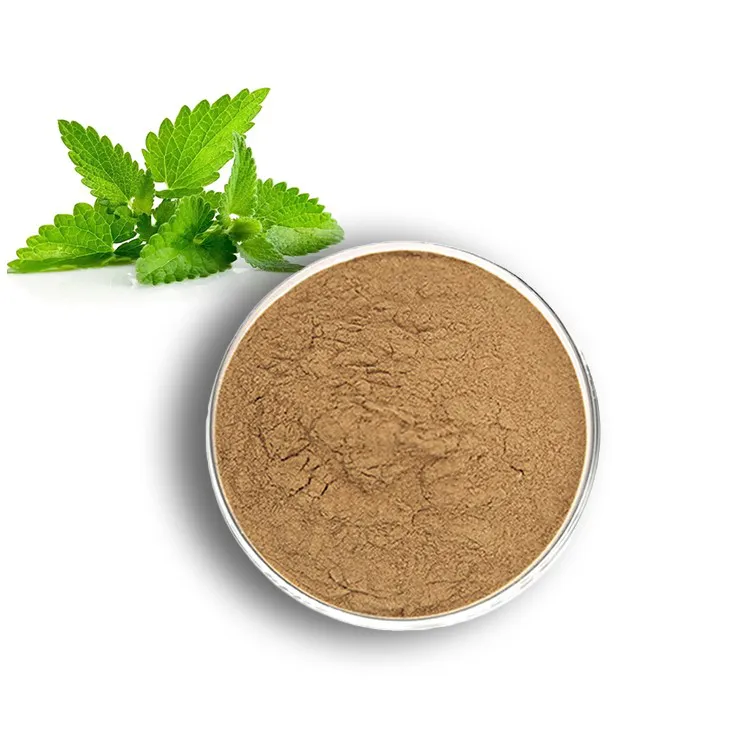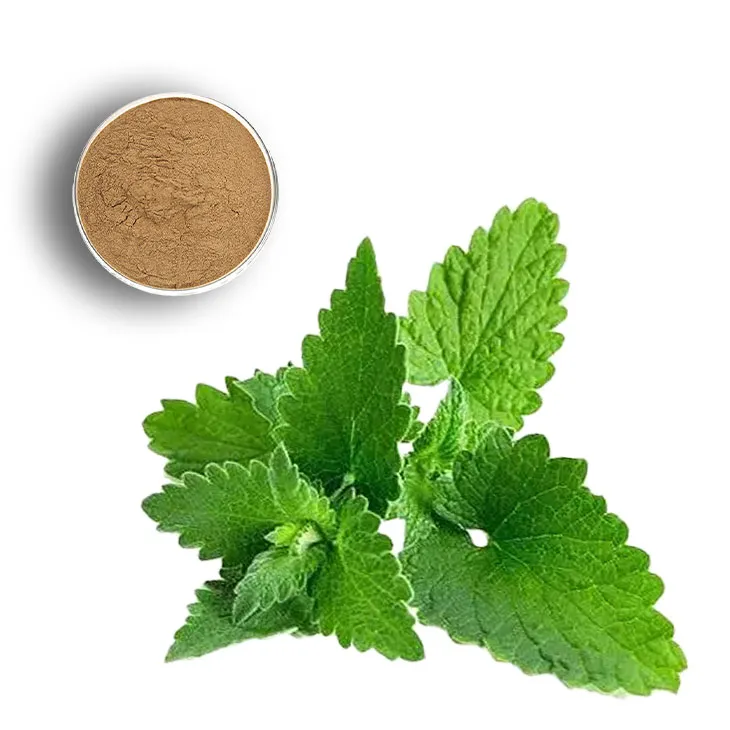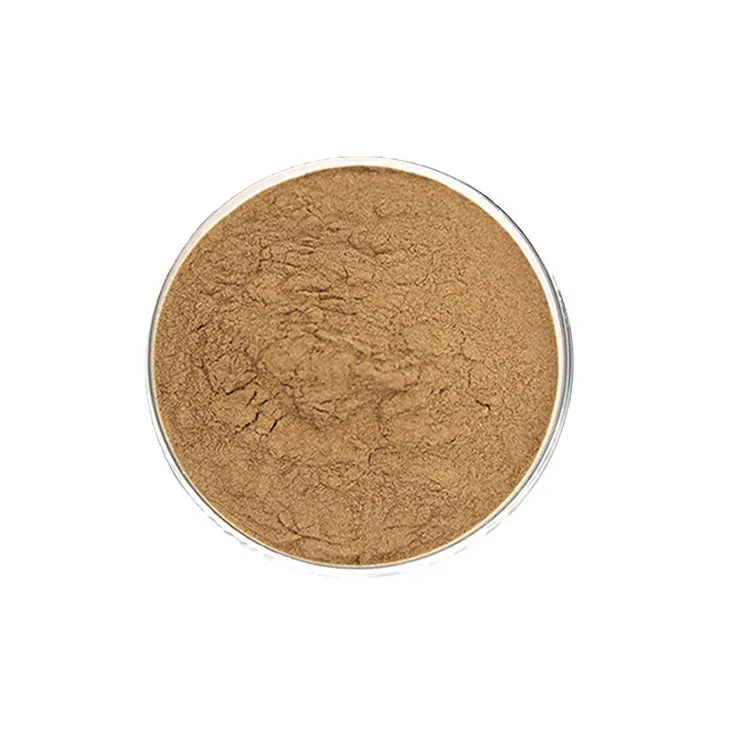- 0086-571-85302990
- sales@greenskybio.com
Lemon balm extract: A botanical medicine for treating anxiety, insomnia, etc.
2024-11-12

Introduction
In recent years, the search for natural remedies for various health conditions has been on the rise. Among these, Lemon Balm Extract has emerged as a promising botanical medicine. Derived from the lemon balm plant (Melissa officinalis), this extract has a long history of use in traditional medicine. It is now being increasingly studied for its potential in treating a range of health problems, with particular focus on anxiety and insomnia.

The Source: Lemon Balm Plant
The lemon balm plant is a perennial herb that is native to Europe, North Africa, and West Asia. It has a pleasant lemon - scented aroma, which is characteristic of its essential oils. The leaves of the plant are typically used to prepare the extract. They are rich in various bioactive compounds that contribute to its therapeutic effects.

Active Compounds in Lemon Balm Extract
1. Terpenes
Terpenes are a large class of organic compounds found in Lemon Balm Extract. They play a significant role in the plant's aroma and also possess potential medicinal properties. For example, some terpenes have been shown to have antioxidant and anti - inflammatory effects. These properties may contribute to the overall well - being of the body and potentially help in reducing symptoms associated with stress - related disorders.
2. Flavonoids
Flavonoids are another important group of compounds present in lemon balm extract. They are known for their antioxidant activity, which helps in protecting the body's cells from damage caused by free radicals. In addition, flavonoids may also interact with the body's signaling pathways, potentially modulating the nervous system's response and contributing to the anti - anxiety and sleep - promoting effects of the extract.
3. Rosmarinic Acid
Rosmarinic acid is a phenolic compound found in lemon balm. It has been studied for its anti - inflammatory, antioxidant, and antiviral properties. In the context of treating anxiety and insomnia, its anti - inflammatory effect may be relevant as chronic inflammation has been associated with mood disorders. By reducing inflammation, rosmarinic acid may help in normalizing the body's physiological state, which could in turn alleviate anxiety symptoms and improve sleep quality.

Mechanism of Action on Anxiety
1. Neurotransmitter Regulation
One of the key ways in which lemon balm extract may act on anxiety is through the regulation of neurotransmitters. It has been found to interact with gamma - aminobutyric acid (GABA), an inhibitory neurotransmitter in the brain. By enhancing GABAergic activity, the extract can help to calm the nervous system. GABA plays a crucial role in reducing neuronal excitability, and when its function is enhanced, it can lead to a reduction in anxiety - like symptoms. For example, in pre - clinical studies, lemon balm extract has been shown to increase GABA levels in the brain, which is associated with a more relaxed state.
2. Modulation of the Hypothalamic - Pituitary - Adrenal (HPA) Axis
The HPA axis is a major part of the body's stress response system. Chronic stress can dysregulate this axis, leading to increased production of stress hormones such as cortisol. Lemon balm extract may help in modulating the HPA axis, thereby reducing the over - production of cortisol. By normalizing the stress response, it can contribute to a reduction in anxiety. In some studies, it has been observed that treatment with lemon balm extract can lead to a decrease in cortisol levels in stressed individuals, indicating its potential in regulating the body's stress response mechanism.

Mechanism of Action on Insomnia
1. Relaxation of the Nervous System
Similar to its effect on anxiety, lemon balm extract helps in relaxing the nervous system, which is crucial for improving sleep quality. A relaxed nervous system is less likely to be in a state of arousal, which can interfere with sleep. By acting on neurotransmitters and reducing stress - related signals, the extract promotes a state of calmness that is conducive to falling asleep and staying asleep. For instance, individuals who have used lemon balm extract have reported feeling more relaxed in the evenings, which has led to an easier time falling asleep.
2. Reduction of Restlessness
Insomnia is often accompanied by restlessness, where the mind and body are in a state of agitation. Lemon balm extract can help in reducing this restlessness. The active compounds in the extract may work on the body's physiological processes to calm muscle tension and reduce mental agitation. This reduction in restlessness can significantly improve the overall sleep experience, allowing individuals to achieve a more restful and uninterrupted sleep.
Research Evidence
1. Clinical Trials on Anxiety
Several clinical trials have been conducted to evaluate the effectiveness of lemon balm extract in treating anxiety. In one study, participants with generalized anxiety disorder were given either lemon balm extract or a placebo. After a certain period of treatment, those who received the lemon balm extract showed significant improvements in their anxiety symptoms compared to the placebo group. The participants reported reduced feelings of worry, nervousness, and tension. Another trial focused on patients with mild - to - moderate anxiety symptoms and found that lemon balm extract was effective in reducing anxiety levels as measured by standardized anxiety scales.
2. Clinical Trials on Insomnia
Regarding insomnia, research has also provided promising results. A study involving individuals with sleep problems found that those who took lemon balm extract had an improvement in their sleep quality. They reported shorter sleep latency (the time it takes to fall asleep), fewer awakenings during the night, and an overall increase in the duration of sleep. In addition, subjective reports of sleep satisfaction were also higher in the group that received the extract compared to the control group.
Comparison with Synthetic Medications
1. Safety Profile
One of the main advantages of lemon balm extract over some synthetic medications for anxiety and insomnia is its safety profile. Synthetic drugs often come with a range of side effects, some of which can be quite severe. In contrast, lemon balm extract, being a natural product, generally has a lower risk of adverse effects. However, it is important to note that it may still interact with certain medications, so it is advisable to consult a healthcare provider before use. For example, some people may experience mild gastrointestinal discomfort when taking lemon balm extract, but this is relatively rare compared to the side effects associated with many synthetic drugs.
2. Efficacy
While synthetic medications for anxiety and insomnia can be highly effective in many cases, lemon balm extract has also shown significant efficacy in treating these conditions. In some cases, it may not be as potent as certain drugs, but for those who prefer a natural approach or who experience significant side effects from synthetic medications, lemon balm extract can be a viable alternative. It may also be used in combination with other therapies or medications, under the guidance of a healthcare professional, to enhance the overall treatment outcome.
Methods of Administration
1. Oral Supplements
Lemon balm extract is commonly available in the form of oral supplements, such as capsules or tablets. These are convenient for daily use and are formulated to provide a standardized dose of the active compounds. When taking oral supplements, it is important to follow the recommended dosage instructions provided by the manufacturer or as advised by a healthcare provider.
2. Herbal Teas
Another popular method of consuming lemon balm extract is in the form of herbal teas. Dried lemon balm leaves can be steeped in hot water to make a soothing tea. This method not only provides the benefits of the extract but also offers a relaxing and enjoyable beverage. However, the concentration of the active compounds in herbal teas may vary depending on factors such as the quality of the leaves and the brewing time.
3. Topical Applications
In some cases, lemon balm extract is also used topically. It may be included in creams or ointments for various purposes, such as reducing skin irritation or promoting relaxation through skin absorption. However, the effectiveness of topical application for treating anxiety and insomnia is not as well - established as oral ingestion or inhalation methods.
Precautions and Considerations
1. Allergic Reactions
Some individuals may be allergic to lemon balm or its components. Allergic reactions can range from mild skin rashes to more severe respiratory symptoms. Before using lemon balm extract, it is important to check for any known allergies. If an allergic reaction occurs, it is necessary to discontinue use immediately and seek medical attention.
2. Interaction with Medications
As mentioned earlier, lemon balm extract may interact with certain medications. For example, it may potentiate the effects of sedative - hypnotic drugs, leading to excessive drowsiness. It can also interact with drugs that are metabolized by the liver, potentially affecting their efficacy or safety. Therefore, it is crucial to inform your healthcare provider about any use of lemon balm extract if you are taking other medications.
3. Pregnant and Lactating Women
There is limited research on the safety of lemon balm extract during pregnancy and lactation. Due to the potential risks to the fetus or nursing infant, it is generally recommended that pregnant and lactating women avoid using lemon balm extract unless under the guidance of a healthcare provider.
Conclusion
Lemon balm extract is a botanical medicine with significant potential in treating anxiety and insomnia. Its natural origin, combined with its multiple mechanisms of action and the evidence from research studies, make it an attractive option for those seeking natural alternatives for these common health problems. However, like any treatment, it is important to use it with caution, taking into account precautions and potential interactions. With further research, it is likely that the role of lemon balm extract in the management of anxiety, insomnia, and other related conditions will be even more clearly defined.
FAQ:
1. What are the active compounds in lemon balm extract?
Lemon balm extract contains various active compounds. Some of the main ones include rosmarinic acid, eugenol, and citral. These compounds contribute to its therapeutic properties such as its ability to act on neurotransmitters and have anti - inflammatory and antioxidant effects.
2. How does lemon balm extract regulate mood?
Lemon balm extract acts on the body's neurotransmitters, specifically GABA (gamma - aminobutyric acid). GABA is an inhibitory neurotransmitter that helps to reduce neuronal excitability. By enhancing GABAergic activity, lemon balm extract can calm the nervous system and regulate mood, thus helping to relieve symptoms of anxiety.
3. Is lemon balm extract safe for long - term use?
Generally, lemon balm extract is considered safe for long - term use. However, as with any supplement or medicine, it is advisable to consult a healthcare provider. In some cases, it may cause mild side effects such as nausea or dizziness, but these are relatively rare. Pregnant and breastfeeding women should be especially cautious and seek medical advice before using it.
4. Can lemon balm extract be used with other medications?
There may be potential interactions between lemon balm extract and other medications. For example, it may interact with medications that affect the central nervous system or have sedative effects. It is crucial to inform your doctor if you are taking lemon balm extract while on other medications to avoid any adverse effects or reduced efficacy of either the extract or the prescribed drugs.
5. How long does it take for lemon balm extract to show its effect on insomnia?
The time it takes for lemon balm extract to show an effect on insomnia can vary from person to person. Some people may notice an improvement in sleep quality within a few days, while for others, it may take a couple of weeks. Consistent use is often key, and it is recommended to follow the dosage instructions carefully.
Related literature
- The Anxiolytic and Sleep - Promoting Effects of Lemon Balm (Melissa officinalis L.)"
- "Lemon Balm Extract in the Treatment of Anxiety and Related Disorders: A Review of Clinical Studies"
- "Botanical Medicines for Insomnia: A Systematic Review of Efficacy and Safety"
- ▶ Hesperidin
- ▶ Citrus Bioflavonoids
- ▶ Plant Extract
- ▶ lycopene
- ▶ Diosmin
- ▶ Grape seed extract
- ▶ Sea buckthorn Juice Powder
- ▶ Fruit Juice Powder
- ▶ Hops Extract
- ▶ Artichoke Extract
- ▶ Mushroom extract
- ▶ Astaxanthin
- ▶ Green Tea Extract
- ▶ Curcumin
- ▶ Horse Chestnut Extract
- ▶ Other Product
- ▶ Boswellia Serrata Extract
- ▶ Resveratrol
- ▶ Marigold Extract
- ▶ Grape Leaf Extract
- ▶ New Product
- ▶ Aminolevulinic acid
- ▶ Cranberry Extract
- ▶ Red Yeast Rice
- ▶ Red Wine Extract
-
Grapefruit Seed Extract Powder
2024-11-12
-
Acerola Extract
2024-11-12
-
Citrus Aurantium Extract
2024-11-12
-
Phellodendron Extract
2024-11-12
-
Tormentil Extract
2024-11-12
-
Wheat Germ Extract
2024-11-12
-
Lycopene
2024-11-12
-
Oat Straw Extract Powder
2024-11-12
-
Resveratrol extract
2024-11-12
-
Giant Knotweed Extract
2024-11-12





















